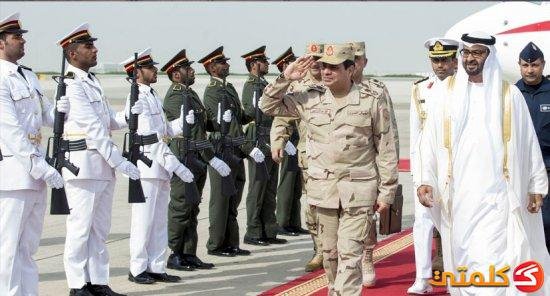Audio recordings of senior Egyptian officials that were leaked Sunday by suggested that the United Arab Emirates gave the Egyptian Defense Ministry money for a protest campaign against former President Mohammad Mursi.
 Audio recordings of senior Egyptian officials that were leaked Sunday by suggested that the United Arab Emirates gave the Egyptian Defense Ministry money for a protest campaign against former President Mohammad Mursi.
Audio recordings of senior Egyptian officials that were leaked Sunday by suggested that the United Arab Emirates gave the Egyptian Defense Ministry money for a protest campaign against former President Mohammad Mursi.
The recordings, leaked by Mekameleen TV, a satellite channel based in Istanbul, appear to indicate that both the Egyptian military and its backers in the Emirates played a much more active role in fomenting the protests against Mursi and in funding the Tamarod opposition movement in June 2013 than either party has acknowledged.
President Abdul Fattah el-Sisi, who was then the defense minister, said he was acting in response to the protests when he led the ouster of Mursi.
The New York Times reported that the audio recordings are the latest in a long series that appear to capture the private meetings and phone calls of senior defense officials.
Egyptian officials said that the recordings are fabrications, but many Egyptian commentators treat them as credible, giving them weight in public opinion, even though all have been released through news outlets that oppose President Sisi.
"Everything, absolutely everything is under surveillance," Mohamed Hassanein Heikal, a historian and journalist who is close to senior defense officials, said in a television interview when asked about previous leaked recordings.
Heikal said that amid all the turmoil in Egypt, it would not be surprising that such recordings would have been made.
"Who records during the time of chaos?" he said. "Everyone records during the time of chaos."
The recordings appeared to have been made in an office at the Defense Ministry and to date from near the end of Mursi’s presidency.
They appear to record Gen. Abbas Kamel, Sisi’s office manager and top aide, speaking by telephone with Gen. Sedky Sobhy, who was then the military chief of staff and is now defense minister in Egypt.
They were discussing a bank account controlled by senior defense officials that had been used by the Tamarod movement that called for protests on June 30, 2013 to demand an early end to Mr. Mursi’s presidency.
"Sir, we will need 200 tomorrow from Tamarod’s account — you know, the part from the U.A.E., which they transferred," General Kamel told General Sobhy in the recording.
General Sobhy’s side of the conversation is not heard. But he apparently brought up the Egyptian intelligence services, or mukhabarat.
"What do you mean by mukhabarat, sir? The mukhabarat guys?" General Kamel said. "Do you remember the account that came for Tamarod?"
He then said to General Sobhy, "We will need only 200 from it — yes, 200,000." If that sum was in Egyptian pounds, it would have been equivalent to about $30,000 at the time.
Additionally, Kamel purportedly informed Sobhi in a separate phone call that the "Emirati delegation arriving on Tuesday might be accompanied by Tony Blair", and that Tony Blair will meet "the minister" the following day.
However, "they insist it won’t be published", he said, presumably referring to the news of the arriving delegation.
Kamel allegedly added that Blair will meet Gen. Mahmoud Hegazy, and wanted to meet with then-minister of foreign affairs Nabil Fahmy as well.
Mursi, a Muslim Brotherhood President, was Egypt’s first freely elected president. But he held office for only a year before he was removed on July 3, 2013.
Many activists and commentators said in 2013 that they thought the Egyptian intelligence services had played some role in aiding Tamarod, but no concrete evidence emerged.
When Tamarod planned a day of protests against Mursi, Sisi hinted that his military might intercede if the turnout was high.
Once Mursi was ousted, both the United Arab Emirates and Saudi Arabia swiftly made it clear that they approved of the step. Both became major donors to the new government.
In addition to financing the protest effort, the leaked recordings suggested that the Emirates and the Egyptian military played active roles in organizing the protests.
A spokesman for the Egyptian military, Gen. Mohammad Samir Abdul Aziz, declined to comment Sunday concerning the recordings, and referred all questions to the office of the president.
These recordings follow a series of leaks that were allegedly recorded, for either Sisi or the head of his office Abbas Kamel.
In January, a recording unfolded that Sisi’s office was talking about media figures and what exactly they should be saying on television. A couple of weeks later, a new recording was released, referring to the leaders of Gulf countries, and saying that they have too much money.
Furthermore, Kamel described Gulf leaders in one recording as "half states".
Since the ouster of Mursi, Egypt has suffered a series of attacks on security forces, which have killed hundreds of soldiers and police officers. The latest took place Sunday, when a small bomb went off near a police station in the city of Aswan.